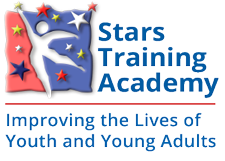Stars Training Academy serves as the purveyor of the Transition to Independence Process (TIP) Model®.
The Transition to Independence Process (TIP) Model is an evidence-supported practice with six published studies supporting its effectiveness to improve post-secondary outcomes. These include: increased employment and post secondary career education, improved community-life functioning, and reductions in the use of intensive mental health services and in incarceration.

The TIP Model is a strength-based, youth-driven framework that was developed for working with youth and young adults (14-29 years old) with emotional/behavioral difficulties (EBD) to:
- Engage youth and young adults in their own futures planning process
- Provide youth with developmentally appropriate, non-stigmatizing, culturally competent, and appealing services and supports
- Involve youth and their families and other informal key players in a process that prepares and facilitates them in their movement toward greater self-sufficiency and successful achievement of their goals related to their relevant transition domains.
The Transition to Independence Process (TIP) Model Institute
The TIP Model Institute functions replace the National Network on Youth Transition and Behavioral Health (NNYT). The TIP Model Institute applies research-based fidelity standards for the training, implementation and sustainability of the TIP Model at the practice, program, and system levels to improve the outcomes of youth and young adults with emotional, behavioral, cognitive, and/or mental health challenges.
The TIP Model Institute consists of a Professional Advisory Committee and a Certification and Accreditation Board.
The TIP Model Institute Professional Advisory Committee advises and provides recommendations on TIP Model Institute policies and procedures and identifies TIP Model-related research needs.
Consultant/Trainers
Site-Based Trainers
Regional Fidelity Assessor
Specifically, the TIP Model® focuses on:
- Engaging youth and young adults in their own futures planning process
- Providing youth with developmentally appropriate, non-stigmatizing, culturally competent, and appealing services and supports
- Involving youth and their families and other informal key players in a process that prepares and facilitates them in their movement toward greater self-sufficiency and successful achievement of their goals related to their relevant transition domains.
- The TIP Model® Training option you choose: For example, if you want a brief TIP Model® Overview Training it would cost less than if you chose a more comprehensive, high-fidelity TIP Model Training and Implementation process
- The number of individual participants included in the TIP Model® training(s). We assign one TIP Model® Consultant for every 15-20 trainees and will add more TIP Consultants as needed as the number of trainees increases.
- The locations and total number of program sites to receive TIP Model® Training
All Training Academy consultants are seasoned clinicians with a wealth of professional training experience. The TIP Model® Consultants utilize research-based training and implementation methods as they provide consultation and technical assistance to help organizations achieve sustainable, high-fidelity TIP Model® practices in their programs.
I have worked for the TIP program for almost 10 years and have seen how much the model; using the guidelines and competencies have helped young adults enhance their skills and successfully transition to adulthood.
We live in a rural area and have a shortage of services for our young people. TIP has proven to be very helpful in engaging young people and providing our caseworkers with the necessary tools to best meet their needs. TIP is an innovative, person-center practice filled with easy to use and creative tools! I truly feel that with TIP, we are able to provide the best service possible.
Both Elijah and Coral are wonderful trainers — knowledgeable, funny, creative, energetic, sincere, engaging, leaders, passionate, warm, and outstanding teachers. That was the consensus of all mentors and staff during our three-day training. The mentors asked a lot of questions and were very engaged.



